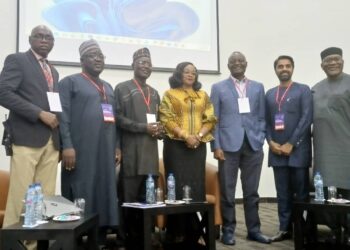Oluyinka Onigbinde
The Chairman, Apapa Local Government Area, Mrs. Idowu Adejumoke Sebanjo has lamented the high unemployment rate among indigenous youths in Apapa, despite the area being touted as the commercial centre of the nation’s economy.

Speaking during a programme organized by Maritime Anti-Corruption Network (MACN) and the Convention on Business Integrity (CBI) with the theme: “Retooling the Maritime Sector for Stronger Economic Growth” in Lagos on Wednesday, she decried the high level of unemployment among employable youths in the community despite the massive revenue being generated from the two ports in Lagos. This is even as she lamented that none is coming to the Local Government; being the host community to the port.
She informed that on a daily basis her table is flooded with letters for financial help and resident have to grapple with the harassment of the social miscreants seeking jobs.
She also decried the rate at which investments in the port are rotting away because of lack of patronage which she credited to unbearable traffic congestion.
The local government chair said: “Since I resumed this office, I’ve come to understand that there’s so much poverty. People are struggling and have no jobs.
“For us in Apapa, revenue is an issue, unemployment is an issue. Millions and billions of money pass through my Local Government and none of this money is coming to the Apapa Local Government”.
She specifically, lamented that even from proceeds of the Nigerian Ports Authourity electronic call up system, popularly called ‘eto’, the Local Government does not receive anything.
Stating further, she added that, “luckily for us, they’ve done some of our roads which are much better, but the trailers are still there. People have invested so much money. Look at ShopRite, same thing with the Amusement park where you can take your children. They have spent a huge amount of money to build up the place, but who is that parent that will say take my children to Apapa amusement park when the reality is that they are going to spend five hours on the road.
“The miscreants you are seeing on the road, yes today, the money they are collecting on the road is more than what any employer is going to pay them. So, most of them are not ready to work. They have seen and tasted the kind of money that they are making on the road. Even they themselves will frustrate whatever it is that the government wants to do but if we have strict policies, people will fall in line eventually”.
Speaking earlier, the Executive Secretary, Nigerian Shippers’ Council (NSC), Emmanuel Jime, while delivering a paper titled, “Setting the Tone: The Place of the Maritime Industry in Nigeria’s economy, informed that Togo with a population of less than eight million people is generating more revenue in shipping than Nigeria with more than 200 million in population.
“According to the United Nations Conference of Trade and Development, (UNCTAD), Togo with a population of about 8 million people and GDP of $7 billion had a throughput of 1.7 million in 2020.
“While Nigeria with a population of 206 million people, GDP of about USD 429 Billion had a lesser TEU of 1.5 million in 2020. This is as a result of inefficiency in our port operations which led to diversion of Nigerian bound cargoes to other neighbouring countries,” he said.
Speaking further on how to optimize port operation to generate more revenue, he said, “massive investment in infrastructure should be prioritized by the government. And I keep saying it anytime I talk about the Lekki Deep Seaport, unless we maximize multimodal means of transportation, we will just have a replica of Apapa port. And it is going to be a tragedy. Rail linkage is a critical aspect we should explore.
“Notwithstanding the achievement recorded so far by the implementation of the Manual, there is need for deliberate and conscious effort by the Federal Government and all relevant stakeholders in the industry to ensure that the right things are done for the sector to optimally contribute adequately to the GDP of the nation’s economy and also ensure that Nigerian trade benefit from both the regional trade agreement (ECOWAS ETLS) and the continental trade agreement (AfCFTA).Going forward, there should be deliberate effort in addressing the following;
“Investment in Infrastructure: Provision of rail linkages and development of other transportation modes for cargo evacuation in the Nigerian Ports. Harmonization of all government agencies processes and procedures in port operations i.e. implementation of National Single Window. There should be synergy among government agencies involved in port operations to adequately address issues of overlapping functions. Sustenance of the implementation of Ease of Doing Business Action Plans Speedy passage of proposed Port Reform Bills at the Presidency and National Assembly.” he said.
Also speaking at the event, the co-founder CBI Nigeria, Mr Soji Apampa said the purpose of the conference is to examine the policies, practices, opportunities, and next steps in addressing the lingering challenges in port operations which affects all categories of stakeholders in the maritime sector, including a review of how to expand the current gains and systems reforms in sectors of the industry.
He said: “The conference will evaluate the extent to which the strategies and tools (e.g. Collective Action, introduction of the SOPs and Grievance Reporting Mechanisms (Help Desk, User Experience Diary), and Learning Management System) deployed through the MACN Nigeria Project have improved institutional compliance practices and the operating environment in the maritime sector, including the outcomes for different stakeholders.
“Key leadership stakeholders. from government, civil society and the private sector will deliver keynote addresses and present data to explain the state of port operations today, implementation of consequence management as part of a wider compliance framework, and capacity strengthening for port officials in the industry” he said.
Kindly like us on Facebook/twitter















